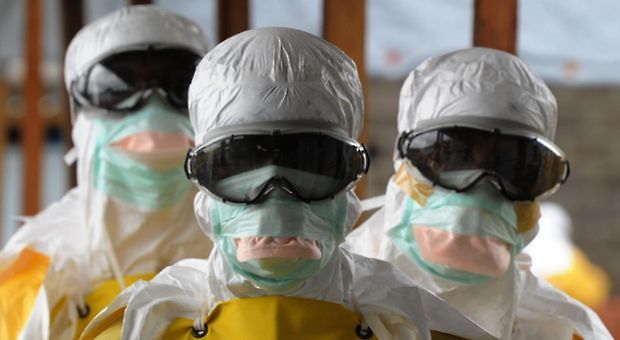
In a sobering statement released on Monday, the World Health Organization warned that the Ebola outbreak is the “most severe acute health emergency in modern times.”
Speaking at a regional health conference in Manila, the capital city of the Philippines, WHO Director-General Margaret Chan said that most countries where Ebola has spread have failed “to put basic public health infrastructures in place.” She added that new cases of Ebola are now “rising exponentially” in the three hardest-hit countries of Guinea, Liberia, and Sierra Leone.
“I have never seen a health event threaten the very survival of societies and governments in already very poor countries,” Chan said Monday in a statement to a regional health conference in the Philippine capital Manila. “I have never seen an infectious disease contribute so strongly to potential state failure.”
Encouraging people and health officials to get informed about how to prevent Ebola, Chan explained that 90 percent of economic losses during the outbreak of any disease comes from “the uncoordinated and irrational efforts of the public to avoid infection.”
Indeed, fears of Ebola are spreading much faster than the disease itself, leading to ‘knee-jerk responses‘ that compromise the integrity of the public health response in West Africa and threaten to exacerbate the international crisis.
“We are seeing, right now, how this virus can disrupt economies and societies around the world,” Chan said.
‘The rich get the best care… The poor are left to die’
Chan explained that the world “is ill-prepared to respond to any severe, sustained, and threatening public health emergency,” but said that educating the public about preventing and stopping Ebola was currently the best defense strategy.
“Ebola emerged nearly 40 years ago,” Chan said in the statement. “Why are clinicians still empty-handed, with no vaccines and no cure? Because Ebola has been, historically, geographically confined to poor African nations. The R&D [research & development] incentive is virtually non-existent. A profit-driven industry does not invest in products for markets that cannot pay.”
She continued:
First, the outbreak spotlights the dangers of the world’s growing social and economic inequalities. The rich get the best care. The poor are left to die.
Second, rumors and panic are spreading faster than the virus. And this costs money. Ebola sparks nearly universal fear. Fear vastly amplifies social disruption and economic losses well beyond the outbreak zones. The World Bank estimates that 90% of economic losses during any outbreak arise from the uncoordinated and irrational efforts of the public to avoid infection.
Third, when a deadly and dreaded virus hits the destitute and spirals out of control, the whole world is put at risk. Our 21st century societies are interconnected, interdependent, and electronically wired together as never before.
Chan also praised the Philippines for holding an anti-Ebola summit last week, warning that the Southeast Asian country was vulnerable due to the large number of Filipinos working abroad. But while bracing for Ebola, health officials should continue to focus on major health threats, including non-communicable diseases, Chan said.
Coordinated global action needed to prevent unprecedented crisis
According to the latest WHO figures, more than 4,000 people have died since the outbreak started in March — more than 3,500 of which have occurred in just the past two months. On Oct. 8, the first person ever diagnosed with Ebola in the U.S. – a Liberian man named Thomas Eric Duncan – died in a hospital in Dallas.
On Sunday, the Texas Health Presbyterian Hospital announced that a nurse who cared for Duncan had contracted Ebola and was quarantined in an isolation unit at the hospital. According to the Centers for Disease Control and Prevention (CDC), a “breach of protocol” led to the infection, which marks the first case of human-to-human transmission of Ebola on American soil. The CDC is now monitoring all hospital workers who treated Duncan, Director Dr. Tom Frieden said.
“We have to rethink the way we address Ebola infection control, because even a single infection is unacceptable,” Dr. Frieden said in a press conference on Monday. He stressed that all health care workers must get proper training to deal with potential Ebola patients. “Stopping Ebola is hard. We’re working together to make it safer and easier,” he said. “Together I’m confident that we will stop it. What we all need to do is take responsibility for improving the safety of those on the front lines.”
The WHO’s latest statement comes just days after Dr. Frieden warned that the Ebola virus poses a threat equivalent to the AIDS epidemic and will become just as deadly without further action. “In the 30 years I’ve been working in public health, the only thing like this has been AIDS,” he said. “And we have to work now so that this is not the world’s next AIDS.”
Last month, U.N. Secretary-General Ban Ki-moon called on leaders from the countries most affected by the outbreak to create special centers to keep infected people isolated from non-infected relatives in an effort to prevent further transmission. ‘
Global health leaders have also urged governments, airlines, and shipping companies to continue providing services to the Ebola-stricken region, which is in desperate need of resources and personnel. Banning travel to these countries would actually be counterproductive, experts say, because it would impede deliveries of critical supplies and deter healthcare workers from volunteering to help in the area.
Despite a scaled-up global response, experts on the ground in West Africa warn that the outbreak is still outpacing efforts to fight it. “The virus is far ahead of us and every day the situation gets worse,” Anthony Banbury, the head of the United Nations’ emergency Ebola mission, told UN leaders after getting back from a tour of Liberia, Guinea and Sierra Leone, the nations worst hit by the epidemic. “Collectively we must stop the spread to other countries and ensure that countries are prepared to rapidly detect, control, and eliminate the virus if it is introduced.”
